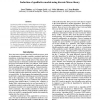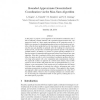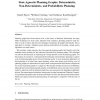AI
2011
Springer
14 years 9 months ago
2011
Springer
115
click to vote
AI
2011
Springer
14 years 9 months ago
2011
Springer
When donating money to a (say, charitable) cause, it is possible to use the contemplated donation as a bargaining chip to induce other parties interested in the charity to donate ...
AI
2011
Springer
14 years 9 months ago
2011
Springer
Much like relational probabilistic models, the need for relational preference models arises naturally in real-world applications where the set of object classes is fixed, but obj...
126
Voted
AI
2011
Springer
14 years 9 months ago
2011
Springer
Qualitative models are often a useful abstraction of the physical world. Learning qualitative models from numerical data sible way to obtain such an abstraction. We present a new ...
115
click to vote
AI
2011
Springer
14 years 9 months ago
2011
Springer
The binary relation framework has been shown to be applicable to many real-life preference handling scenarios. Here we study preference contraction: the problem of discarding sele...
133
click to vote
AI
2011
Springer
14 years 9 months ago
2011
Springer
In this paper we present a general framework for the comparison of intervals when preference relations have to established. The use of intervals in order to take into account impr...
168
click to vote
AI
2011
Springer
14 years 9 months ago
2011
Springer
The ability to achieve one’s goals is a defining characteristic of intelligent behaviour. A great many existing theories, systems and research programmes address the problems a...
147
Voted
AI
2011
Springer
14 years 9 months ago
2011
Springer
In this paper we propose a novel approach to decentralised coordination, that is able to efficiently compute solutions with a guaranteed approximation ratio. Our approach is base...
163
click to vote
AI
2011
Springer
14 years 9 months ago
2011
Springer
Planning graphs have been shown to be a rich source of heuristic information for many kinds of planners. In many cases, planners must compute a planning graph for each element of ...




